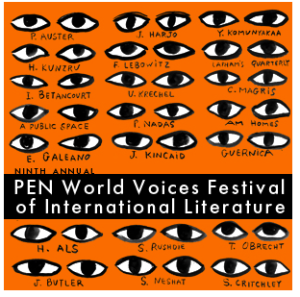 With more than 100 world-class writers in dozens events spanning a week, this year’s PEN World Voices Festival line-up is pretty daunting. I did manage to carve out time to make it out for a few things– and I blogged about an event earlier this week for Words Without Borders. The topic was “The Critic’s Global Voice,” and the panel featured Jean-Euphèle Milcé, Ursula Krechel, and Mikhail Shishkin (with Bookforum editor Albert Mobilio moderating):
With more than 100 world-class writers in dozens events spanning a week, this year’s PEN World Voices Festival line-up is pretty daunting. I did manage to carve out time to make it out for a few things– and I blogged about an event earlier this week for Words Without Borders. The topic was “The Critic’s Global Voice,” and the panel featured Jean-Euphèle Milcé, Ursula Krechel, and Mikhail Shishkin (with Bookforum editor Albert Mobilio moderating):
Reports of the death of American literary culture have been, well, at least a little exaggerated. There’s no other way to explain the steady stream of lively essays bemoaning the health of book reviews, book critics, and literature itself. “Like hazing, reviewing is inflicted by the old and popular on the young and weak,” Elizabeth Gumport wrote, dismissing the genre in n+1. Literary culture is in the midst of a “long slide, reflecting not just a hard market but the manners of a bygone world,” as Michael Wolff recently put it in a churlish column predicting the demise of the New York Times Book Review. At any rate, “most contemporary literary fiction is terrible,” J. Robert Lennon griped in Salon.
But what of the rest of the world? Are we to believe that such assessments hold true for the public dialogue about books—and the role of “professional” readers—in other languages, other markets, other cultures? Bookforum editor Albert Mobilio put the question of the role of criticism to writers from Russia (Mikhail Shishkin), Haiti (Jean-Euphèle Milcé), and Germany (Ursula Krechel) in a Wednesday night PEN festival discussion of “The Critic’s Global Voice.”